
| |
|
| |
|
|
The Return of Steve Vertlieb (Being a continuation of his first interview in 2006) When Peter Boyle died recently, you wrote an homage to his father. Please share it here.
He was broadcast on two different channels in Philadelphia, for he worked for two different stations simultaneously.
I never forgot that encounter, and thanked God that I'd been given an opportunity to express my appreciation for his work. His name, incidentally, was Pete Boyle. His son later became an actor and moved from Philadelphia to the coast to pursue his own career under the name of Peter Boyle. I always wished that I might have had an opportunity to meet Peter-if only to tell him how much I had loved his dad. Regarding the serials and Zorro's Fighting Legion (1939), can you share some more anecdotes about your viewing of serials? Any comments on the Buster Crabbe Flash Gordons and Buck Rogers? Which of those two characters did you/do you prefer? Did you ever meet Crash Corrigan, and have you ever seen The Undersea Kingdom?
I wanted to BE Zorro. I went back to the theatre every time they ran the serial at the Saturday Matinee, and even watched it over and over again on television when TV hosts like Pete Boyle would show it on their programs. I never forgot the exhilaration I felt watching Zorro ride his beautiful stallion, fight the Yacqui Indians and battle the dreaded Don Del Oro in the Caves of Doom. I just made that up, actually. Still, one or two years later when my then wife asked me what I wanted for my birthday, I spent little time wondering about it. Republic Home Video had recently released the serial on video for the very first time, and I said proudly. "I want Zorro's Fighting Legion." She grimaced, as I recall, but agreed to buy it for me. I can still remember this grown man weeping with joy as I began playing the first tape in the set, and heard the musical strains of the Fighting (and Singing) Legion crooning
Men Of Zorro Are We."
My old friend Allan Asherman had interviewed Buster, and so had a cordial relationship with him. I begged Allan to bring my brother, Erwin, and I up to the Catskills to meet my first hero. Allan agreed, and made the appointment with Buster. We took the train to New York, and then a bus that continued onto the Catskill Mountains. There, to my utter joy and delight, we spent an entire afternoon with Flash Gordon, Buck Rogers, Red Barry, and Captain Gallant of the Foreign Legion. Buster was wonderful and regaled us with stories of his experiences with the lovely Jean Rogers, the curmudgeonly Harry Shannon (Dr. Zarkoff), and the girl with an aura about her-Priscilla Lawson (Princess Aura) who tragically lost her leg some years later in an automobile accident. I stayed in touch with Buster by mail over the years and, on a day I'll never forget about ten years later, I returned home from a trip to Baltimore and asked my father if I'd received any telephone calls while I was away. He told me that Buster Crabbe had called. I assumed that my dad was being "cute," and so I asked him again if anyone had called. He said again that Buster Crabbe had called. I think it may have taken roughly a half hour of agitated bantering until he was finally able to convince me that Buster Crabbe had indeed telephoned my parents' home looking for me. He was in town for a convention, and asked everyone he encountered if they knew me or where he might find me. Finally, he checked the white pages of the telephone directory and found a Charles Vertlieb, my dad. He took a chance and telephoned. My dad assured him, happily, that he did indeed know a Steve Vertlieb. I was instructed to telephone Buster at his hotel the next morning.
Care to share any anecdotes about the "Fanexians", "Film Score Monthly" and "Talking Herrmann" mailing lists/sites/bulletin boards and what good stuff/friends you've got there? Sure. In the old days, fans would write into their favorite magazines in order to register their voices, and opinions. These days, in the age of computers and web sites, fans have taken to their key boards in order to make their tastes known.
I've another reason to be grateful to the Herrmann Society. Several years ago I was privileged to be asked to write a lengthy article examining the provocative relationship between Alfred Hitchcock and his principle composer, Bernard Herrmann. The article, published in 2002 by Midnight Marquee Magazine, was well received but limited to the readership dictated by a necessarily small print run.
Herrmann and Hitchcock: The Torn Curtain I tried communicating with the publishers of the magazine, hoping that they might still have retained the original submission on disc. Alas, they did not. It was gone forever, save for the single space, typewritten "copy" that I kept in my own files. Frankly, the idea of having to retype that massive document onto my computer was too terrible a thought to ponder. All seemed lost until a friend at dinner in New Jersey remarked that he could "scan" the article onto a disk and send it to me as an E-Mail. The only difficulty, he said, was that "scanning" was an imperfect science, and that the results would still have to be gone over with a fine tooth comb to correct errors and find missing fragments somehow lost in translation. Still, it was better than having to retype the entire manuscript. Consequently, I spent about three or four hours one Saturday afternoon "fixing" the article, and filling in the blanks with my original hard copy sitting dutifully at my side. Finally, another friend took the finished transfer and converted it, through computer technology, to a more modern and attractive manuscript. The two gentlemen in Germany who created and maintain the Bernard Herrmann Society web site saw the refurbished piece, and asked permission to post it in the "articles" section where it now resides "renewed and restored" as the featured selection on the Society's pages-preserved at last for a whole new generation of film music enthusiasts. You can find it at www.bernardherrmann.org
Dorothy came to Baltimore with her nephews, Bernard Herrmann's two grandsons. I presented the award on stage to a star studded audience that included Janet Leigh, Roger Corman and Alfred Hitchcock's daughter, Patricia. Earlier that afternoon I had shared a seat next to Pat during a panel discussion of her father's films. I was a little concerned about these two celebrity daughters finally meeting, as their parents had not parted on the best of terms. At the conclusion of the panel discussion, a woman approached me and introduced herself as Dorothy Herrmann. I held my breath, and introduced her to Pat. To my relief, they hit it off immediately and even joked about their father's legendary temperaments. In the evening I delivered the much anticipated award to Dorothy and her nephews, as footage of Maestro Herrmann unspoiled on a giant motion picture screen behind me. Bernard Herrmann stood there conducting the orchestra in the climactic sequence of Alfred Hitchcock's The Man Who Knew Too Much, as I acknowledged his genius on stage before him. It was as though he was there in the amphitheatre to accept the honor from me. I've rarely felt so privileged, excited or proud. You wrote that you hated The Fountain. Care to expand on that? Did you like Hugh Jackman? What was your opinion of The Prestige? I loathed The Fountain. I thought it was a pretentious, overblown bore. I was looking forward to seeing it, actually. Perhaps my favorite theme in movies and television programs concerns the power of eternal love-a love so strong and true that it literally transcends the fluid boundaries of time and space, surviving through time and eternity. I can recall, quite affectionately, a number of films that have explored that theme with success, tenderness and eloquence. Films that come to mind include Portrait of Jennie, The Ghost and Mrs. Muir, Peter Ibbetson and Somewhere In Time.
I enjoyed The Prestige, and felt intellectually challenged by its convoluted screenplay. Another film this past year that I found thoroughly delightful was Lake House with Keanu Reeves and Sandra Bullock. It had modest aspirations and an even more modest budget, but it told a hauntingly lovely story and was, I thought, the most successful venture of its kind since Somewhere In Time.
You seemed to enjoy the latest Bond film, Casino Royale. Care to expand on that? Who is your favorite Bond, and which is your favorite Bond movie? I thought that Casino Royale was really a terrific film, and one of the best Bond movies in the long and winding series. I'd place it alongside the earliest, no nonsense productions like Dr. No, From Russia With Love and Goldfinger. Daniel Craig gave the character a sensational, reinvigorated new look, while the film quite literally reinvented the franchise for a new generation of movie lovers. Sean Connery will always represent the definitive portrayal of the character, but Daniel Craig is easily the best to play the spy since the early years of Connery. You were commissioned to do a piece on the old Karloff and Lugosi film, The Black Cat, for a book in England. Are you able yet to share the title of that book, when it's due out, and what other material will be in it? Yes and no. What I mean by that is that I can answer some of your question, but not all. The book, from what I can gather, is about seventy percent completed. The editor is a gentleman from England by the name of Jay Slater who has done these kinds of anthologies, or compilations before. I don't think a title has been assigned to it as yet, but the volume will essentially consist of comparisons between modern and older classic horror films. As Jay is more a student of the modern horror film, his personal thrust will be in extolling the virtues of today's product so to speak. He's asked us older folks to talk about films from the thirties, and to attempt to convince him and a more juvenile audience of their merits, and why we feel that they've stood the test of time. The film I chose to discuss was the 1934 Universal classic, The Black Cat. I tried to do an in depth analysis of the film in order to explain why, in my opinion, the picture has held up so remarkably well, and why it is still so highly regarded by seasoned fans of the genre. The article is called "Subversion of Innocence: Reflections on The Black Cat," and should be published in England some time this year. You've been privileged to meet and develop friendships with many of your personal heroes. Would you care to talk more about some of those memories and experiences? I'd be happy to. The first who comes to mind is Frank Sinatra. Mr. Sinatra has been my idol since 1960. I've adored his artistry and sensitivity. His charm and bravado were early role models for me, while I found enormous respect for his charity and intense loyalty to his friends. We had corresponded a bit during the sixties and seventies.
I feared the worst, and telephoned my doctor. After a brief examination, he discovered that I had somehow developed Hepatitis. This was far more serious than the previous illness, and I feared the worst. He said "Steve, you're going to go home, get into bed, stay in bed, and not get out of bed unless it's to go to the bathroom and then you're going to get back to bed." I said "Doc, that's all well and good, but I have tickets to see Frank Sinatra at the Spectrum next Tuesday night." He said, "No, no, no, you evidently didn't hear what I just told you. I said that you're going to go to bed, stay in bed, not get out of bed unless it's to go to the bathroom, and then get back into bed." I said "You didn't hear me. I have tickets to see Frank Sinatra next Tuesday night, and I'm going to go." He asked "Do you want to live?" I answered in the affirmative, but said that nothing could keep me from attending the concert. My best friend, in whose car I was to ride to the concert, said "It's very simple. I won't take you." Defiantly, and rather stupidly, I yelled back "Then don't. I'll just take the bus." Well, he wound up taking me and, while I adored the show, I grew progressively ill with every passing moment. I could barely stand by the end of the concert, and my friend had to lift me gently from my seat. Being something of a smart ass, he remarked that this constituted an historic moment. When I asked weakly what he meant, he said "Old Blue Eyes meets Old Yellow Eyes." Quite the wit, myself, I replied "Hah, hah, hah." When I returned to my sick bed, I got out my typewriter and wrote Mr. Sinatra a letter about that evening. Some weeks later I received a letter in return marked Sinatra Enterprises. Inside was a note which read:
Frank Sinatra So, a few days later, I was officially notified by the newspaper that they had indeed arranged for a meeting with my idol. I went back stage before the evening's performance and, with a few other longing fans, was ushered into his dressing room. The Inquirer had assigned a photographer to come and cover the event for their well read pages, so I didn't bother bringing my own rinky dink camera. Needless to say, the Inquirer photographer never showed up. I learned later that he regarded the assignment as a bit of fluff, and went to a local bar instead. I was left without an instrument to capture the momentous event. There was a gentleman present from Argentina wearing an expensive camera around his neck. I begged him to take a picture of us. He looked at me and said quite earnestly "I no know how to take picture." Anguished, I said "it's simple -you just point and shoot." Well, I was introduced to Frank as the newspaper contest winner. He put his arm around me and said "Congratulations." The Argentine gentleman shot two pictures. He told me later by telephone that neither photograph had turned out. He wasn't lying when he said "I no know how to take picture." Several weeks later, however, I received a mysterious envelope in the mail. One of the pictures had miraculously been developed. However, his aim was slightly off. The single photo captured all of me, and three quarters of Frank. The first time I had it printed, Mr. Sinatra disappeared entirely from the image. When I asked the camera shop what had happened, they explained quite rationally that as the other image was "imperfect," they decided to eliminate it. I said "I think you've missed the point here."
William Shatner Star Trek had ended with few new offers on the horizon. He feared being permanently type cast in science fiction, and his wife had begun divorce proceedings. He was literally living out of his van, and traveling cross country with his two pet Doberman Pinschers. He seemed wary of strangers as the interview began, but quickly warmed up to us.
After the interview had been completed, he invited us to catch a performance of the play he was starring in, There's A Girl in My Soup. Based on the hit Broadway show, Shatner portrayed a vain television chef whose prized bachelorhood is threatened by the appearance of a fetching young lass who enters his life and menu. The production co-starred the beautiful Jill Haworth who had played opposite Sal Mineo in Otto Preminger's Exodus. At the end of the performance, he stopped for a moment, turned round on stage and waved a personal farewell to us. Apparently, we had broken through the facade and touched the troubled actor.
Don Rickles
Joe Dante
Ever brilliant, we avoided the temptation to sit in the audience and went, instead, around to the back of the theatre. Realizing that we'd hit pay dirt, we observed several jeeps parked in the rear of the theatre painted with elaborate Zebra stripes.
John Wayne
Hugo Friedhofer
Jerry Goldsmith The next morning I was lying in my bed, reading the newspaper, when the telephone rang. Absent mindedly, I picked it up and said "Hello." A rather deep, distinguished voice asked to speak with Steve Vertlieb. "This is Steve," I answered. The voice at the other end of the line said "This is Jerry Goldsmith returning your call." I damn near suffered a stroke. Trying to contain my excitement, I lowered my own voice and tried to sound professional.
Alfred Hitchcock
Within the comedic context of the film, the Italian gang members often listened to the strains of Frank Sinatra singing on their car cassette decks. I figured that Landis must be a Sinatra fan, and so I handed him a poetic tribute I'd written for Frank called "Sinatra." He held it in his hands as one might hold a chunk of excrement and sneered derisively, "Oh, a "poem" about Frank Sinatra?" I felt embarrassed and humiliated, and walked away from him. Later that evening I attended a private writer's party in the convention's hotel suite. John Agar was there, and he pulled me aside to talk. Moments later, John Landis walked into the room and began walking toward John. John immediately reached out for the director's arm, put his other arm around my shoulder and said "John, do you know my good friend Steve Vertlieb?" Landis reached for my hand with an enormous smile on his face, and yelled "Heeeyyyy, Steve."
I got to see John some six weeks before his death. I was visiting some friends in Thousand Oaks, and learned that John was living in a nursing home in the greater Los Angeles area. My brother, Erwin, and my friend Bruce Gearhart went to see Johnny there. He was hooked up to an oxygen tank and had tubes in his nose. As I peered through the door to his room his face lit up, and he called out "Hey, Stever." The room was small with little space for mementos or ornaments.
I think of John often. The newspaper accounts of his death were, I felt, cruel. They spoke of his drinking problems in the late forties, and rushed to the defense of Shirley Temple. None of that belonged in an obituary- a summing up of a man's life. The John Agar I knew for twenty years was a kind, sweet and gentle soul. I miss him.
Martin Milner and George Maharis It wasn't hard to find the crew once we arrived at the hotel. Their production vans and buses were clearly marked, and lining the parking area. As soon as we walked into the lobby of Marriott I grew excited for there, sitting on a couch at the far end of the lobby reading a newspaper, was character actor Murray Hamilton. I'd seen Hamilton in The FBI Story with Jimmy Stewart, and on endless television series. You might remember him as the "Mayor of Shark City" in Steven Spielberg's Jaws. At any rate, he was sitting alone reading his paper and not a single soul in the hotel recognized him. We walked over to him and introduced ourselves. I think that he was so surprised that a pair of twelve and fifteen year old kids would know who he was that he invited us to sit with him in the lobby. For about a half an hour he regaled us with stories of working with Jimmy Stewart in several films, and of playing Mr. Death with Ed Wynn in "One For The Angels" on The Twilight Zone. Meanwhile, Marty Milner was having breakfast in the cafeteria and spotted us staring at him through the window. He was rather intense, and probably didn't appreciate two kids interrupting his meal. In fairness, he was playing perhaps the most powerful and introspective role of his career, and was lost in thought when we intruded. George Maharis was, on the other hand, fun and gregarious and obviously enjoying his newly won fame. He smiled broadly, and invited us to join the crew when they adjourned to the Ben Franklin Bridge in Center City in the early afternoon to film the climactic sequence. So, passionately afire, we took yet another set of busses and trains in order to reach the bridge and watch them film. The sequence, in which the frantic Maharis would finally find his missing, drug-possessed friend threatening suicide atop the towers of the massive bridge, threatening to end his life by jumping into the frenzied traffic below, brought tears to our eyes. "Please don't do it, buddy. I love you," he cried out in character. As the crew wrapped for the day and came down from the bridge, George Maharis gave us a broad smile and shook our hands, thanking us for visiting the set and supporting the program. In the forty-six years since that location filming, I've never forgotten the thrill of being there and watching them film what would become our favorite scene from our favorite episode from our favorite television series. The episode, "The Thin White Line", still raises goose bumps even now when we've the opportunity to see it again.
Jim Danforth and John Morgan
Vincent Price
I recall asking him if I might send him some photographs for autographing, and he was generous enough to write down his home address for me. When I returned to Philadelphia, I mailed him a half dozen or so "stills" for signing which he quickly autographed, and sent back by return mail. Some years earlier, Boris Karloff was kind enough to do the same thing when I wrote him at his hotel in London. These signed pictures are quite precious to me.
The film, written by Tom Holland, was rather a modern updating of Hammer's Curse of the Werewolf, and starred a young actor by the name of Paul Clemens in the title role of a young man who turns into a something of a human moth. We ate with the crew, and set up our interviews. On one hot afternoon, we joined John Dennis Johnston in his motel room for conversation, while Meshach Taylor was thoughtful enough to bring in a case of ice cold beer. I became quite friendly with the young star of the film, Paul Clemens. Paul went on to win an Emmy nomination for his portrayal of a teenager stricken with Turrets Syndrome on an episode of Quincy with Jack Klugman. One night after dinner, I accompanied Paul back to his room. We'd been discussing film music, a mutual passion, but he had to take a moment to telephone his mother. He explained that he called her every night after the day's shooting in order to give her a progress report on his efforts. I stood there in the room with him while he told her how he'd performed, and listened as she gave him some additional tips. After hanging up the phone he turned to me and explained that his mom was "in the business," and that she wanted to be kept informed of events transpiring each day. "Your mom?," I asked. "Who's your mom?" "Eleanor Parker," he said. "Eleanor Parker is my mom." Here I was, standing next to a young actor talking on the telephone to the beautiful red head who had starred opposite Frank Sinatra in both The Man With The Golden Arm and A Hole in the Head, as well as with Charlton Heston in The Naked Jungle and, as the Baroness, with Julie Andrews and Christopher Plummer in The Sound of Music. Oh, before I forget, there was a young liaison in charge of us who saw to our every need while in Mississippi, and met each of our planes. I remember his telling me then that this kind of work was only a steppingstone to bigger things. What he really wanted to do was to direct motion pictures. The young chaperone's name was Mick Garris. He's since gone onto direct many of television's mini-series adaptations of novels by Stephen King, and currently produces Masters of Horror for Showtime Cable. Speaking of Stephen King, I had the honor of sitting at the next table to Stephen at the World Fantasy Convention dinner some years ago. I sat with George Stover, and we offered King a copy of our publication, Cinemacabre. He was very gracious as I recall, and thanked us for allowing him to see the magazine. He was, of course, the guest of honor and was scheduled to receive an award after dinner. When the hotel bar ran out of beer in the midst of dinner, however, King threw on his bomber jacket, went out to the parking lot where he jumped into his car, drove to the nearest tavern, and brought back a six pack which he dumped proudly onto the table cloth adorning his table. In 1970 in Houston, Texas, while working as a consultant on a new musical format for ABC Radio, I met a young filmmaker named Julius D. Feigelson who ran a private screening for my friend Paul Mitchell and I of a short film he'd made based upon "An Occurrence At Owl Creek Bridge" by Ambrose Bierce. We corresponded for a time, but then I lost track of him. Some years later he came to Los Angeles and directed a horror film for television called The Dark Night of the Scarecrow, under the name of J.D. Feigelson. Don Dohler, the popular Baltimore filmmaker, died recently of cancer. I had a chance to work with Don very briefly when he was filming a little horror opus called Fiend. He needed an announcer to do the disembodied voice of a newscaster relating the ghastly details of a horrible murder on the hero's car radio. I was the voice of the anonymous commentator. It was the first time that I ever received screen credit in a film. Another friend, whose name I neglected to mention during the last interview, was Bill Naras who produced and hosted the sixtieth anniversary King Kong celebration held in 1993 at the Gateway Theatre in Chicago.
I don't often frame and hang letters on my living room wall, simply because I live in a one bedroom apartment and don't have a lot of spare room. However, I made two exceptions when former President Bill Clinton wrote me twice about how much he enjoyed my poetic efforts concerning the horror of September 11th, and my tribute to America's fallen soldiers. Both letters were written on President Clinton's official letterhead and were signed personally to me. I thought I'd make an exception in these particular cases. You've been asked to write the liner notes for an upcoming CD. Would you care to tell us about that?
The album was produced during the last week in January, 2007, in Prague and will be released on CD in April. James Fitzpatrick, the fellow who runs Tadlow Records, saw my article on the life of the composer (Time After Time: The Life of Miklos Rozsa), and asked if I'd consider writing the liner notes for the forthcoming album. Of course I said yes. It's quite an honor to be asked to write the commentary for the accompanying booklet on so prestigious a project. The composer's daughter, Juliet, has also been asked to contribute her thoughts on the album for the booklet, and the combined results, to say the least, will be exciting beyond dreams. During our last interview we talked about the production of Kreating Karloff, and how you became involved in it. I gather that your mother is ninety five years old and living in a nursing home. Has she been able to see the film yet and, if so, what did she think of it? It wasn't so very long ago when I was a frightened, shy little boy,afraid of people, afraid of life, living a tentative, lonely and peripheral existence within the shadows of acceptance. My brother and I were raised by very humble, self effacing parents who, themselves, were taught to feel miniscule and unworthy. Pride was something shared by relatives who spoke often of their children's accomplishments, and neighbors or co-workers who couldn't wait to offer tall tales and mementos of their offspring's superior grades, or grandchildren's achievements.
At sixty one years of age, I've struggled my entire life with feelings of unworthiness, ugliness and stupidity. I can't ever remember a time when I didn't feel somehow inadequate. I've spent most of my years "working" to attain a degree of respect from my peers, and from the world around me. I'm still struggling with feelings of inadequacy, and it's been an uphill battle to attain a degree of self worth and artistic pride. There have been times, I imagine, when over the years I've found it either impossible to promote myself, or come embarrassingly near ridicule for over promoting some new "creative" endeavor.
Steve Vertlieb
|
Recommended Reading
|
| |
To see our animated navigation bars, please download the Flash Player from Adobe.
All text © 2006, 2007 The Thunder Child unless otherwise credited.
All illustrations retain original copyright.
Please contact us with any concerns as to correct attribution.
Any questions, comments or concerns contact The Thunder Child.


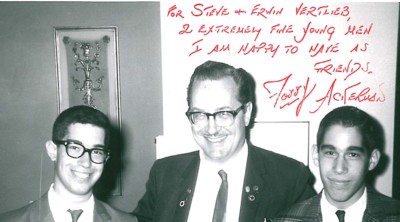 Steve Vertlieb, Forry Ackerman, and Erwin Vertlieb.
Steve Vertlieb, Forry Ackerman, and Erwin Vertlieb. 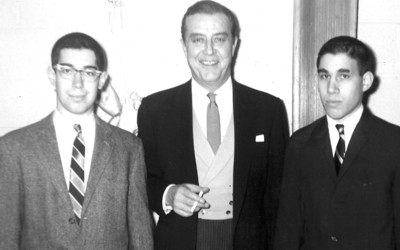
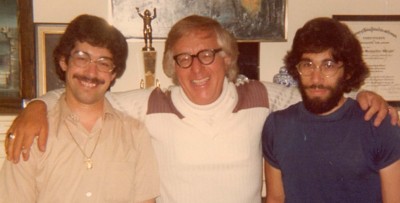 Steve Vertlieb, Ray Bradbury and Erwin Vertlieb.
Steve Vertlieb, Ray Bradbury and Erwin Vertlieb. 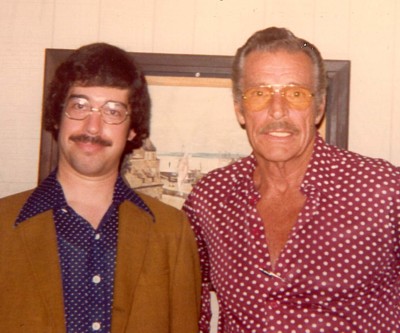 Steve Vertlieb and Buster Crabbe.
Steve Vertlieb and Buster Crabbe. 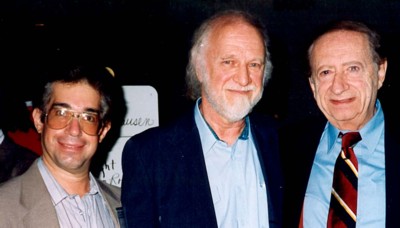 Steve Vertlieb, Richard Matheson and Robert Bloch.
Steve Vertlieb, Richard Matheson and Robert Bloch. 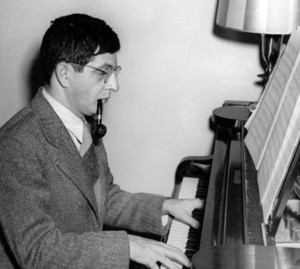
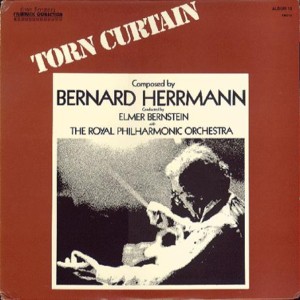
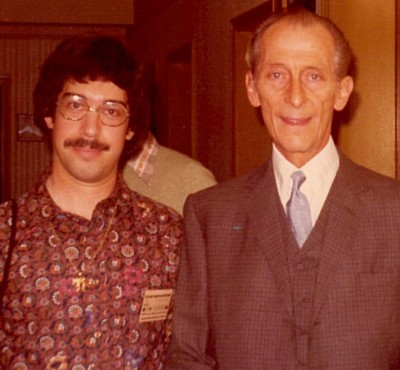 Steve Vertlieb and Peter Cushing.
Steve Vertlieb and Peter Cushing.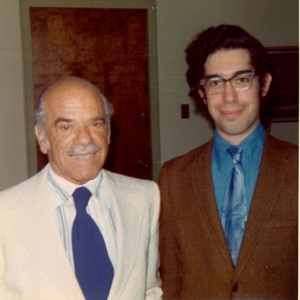 Steve Vertlieb and Frank Capra.
Steve Vertlieb and Frank Capra. 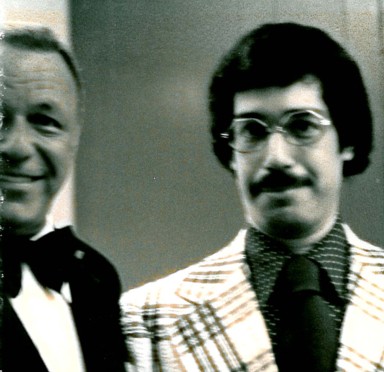 Frank Sinatra and Steve Vertlieb.
Frank Sinatra and Steve Vertlieb.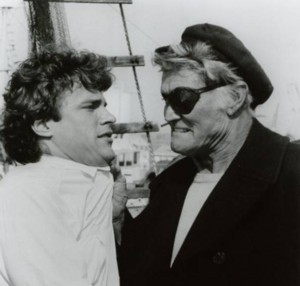
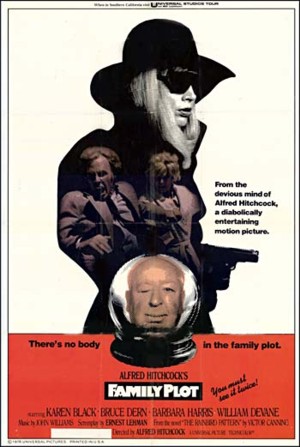
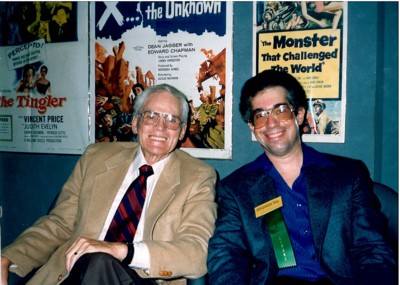 Vertlieb and John Agar
Vertlieb and John Agar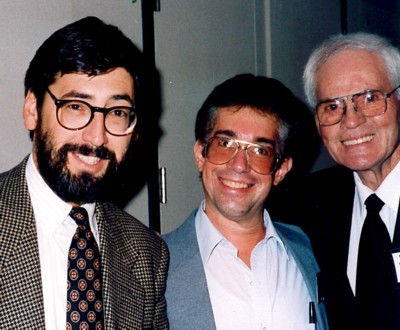
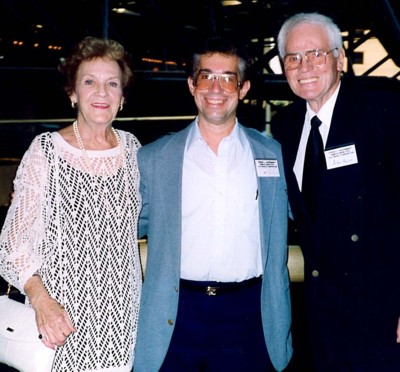
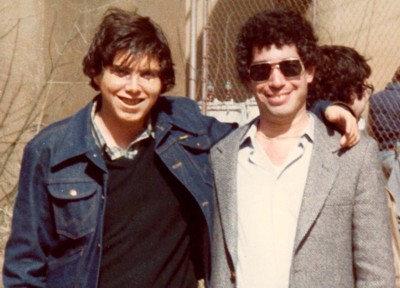
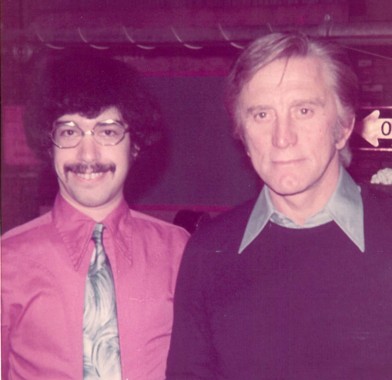
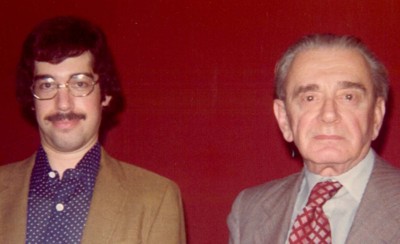
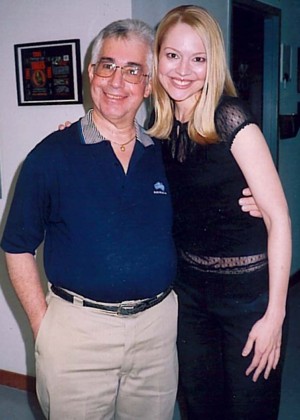 Steve Vertlieb and Liesl Ehardt (of Kreating Karloff).
Steve Vertlieb and Liesl Ehardt (of Kreating Karloff).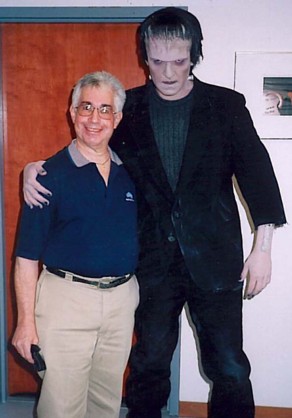 Steve Vertlieb and Conor Timnis as Boris Karloff as Frankenstein's monster.
Steve Vertlieb and Conor Timnis as Boris Karloff as Frankenstein's monster.